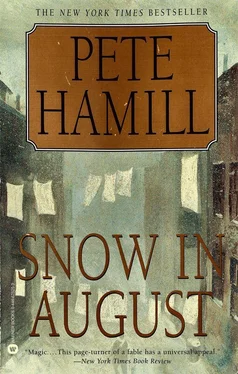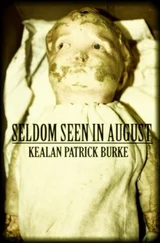Costello turned to the gray-faced detective. “Well, whattaya know? An altar boy that speaks Hebe.”
Abbott chuckled.
“Maybe he can say in Hebe: You’re going to the fucking can.”
And then the fat cop slammed his hand against the icebox door.
“You love the fuckin’ Jews so much,” he shouted, “then help us catch the bum that beat one up!”
Michael wanted to cry, but he held back the tears. He felt himself trembling.
“Mister G is in Kings County Hospital,” the fat one said. “His head is broke. He could die. You know what that means? It means a murder rap against Frankie McCarthy. You know what it means to you ? It means you could be an accessory after the fact. You keep your mout’ shut, you’re guilty too. Of coverin’ up a homicide! You and your friends that were in the candy store that day. Alla yiz. And I’ll see that yiz get put away.”
“That would be some disgrace,” Abbott said, dragging on the cigar. “Break your mother’s heart.”
The fat one pointed at the framed photograph on the wall.
“That your father?”
“Yes.”
“He die in the war?”
“Yes.”
“Where?”
“The Battle of the Bulge.”
Costello sighed.
“The worst battle of the war.”
“Much worse than Pearl Harbor,” the gray-faced cop said.
“You think he died for nothin’?” Costello asked, poking a finger in Michael’s chest.
“ No! He died for his country!”
“You think he died so a shithead like Frankie McCarthy could beat up a Jew?”
“No.”
“You think he’d be proud of you, you cover up for a bum like that?”
The door opened behind them, and Kate Devlin stood there, her face surprised. Michael went to her, trying very hard not to cry.
“Jesus Mary and Joseph, what is this?” she said. “Who the hell are you two bozos?”
The fat cop reached into his back pocket for a wallet. Michael could see his gun, polished blue steel in a worn leather holster.
“Sorry, ma’am,” the fat one said. “We’re detectives.” He showed his badge and handed her a business card. She didn’t take it, and he laid it on the table. “We’re investigating the beating of Mr. Greenberg, from the candy store. He might die, y’ see. And—”
She glowered at them.
“Get out of my house,” she said.
“Listen, we think your son knows—”
“If you don’t get out,” she said, “I’ll throw you out.”
The two cops tipped their fedoras to her and eased around toward the door. Kate Devlin continued hugging her son.
“We’ll be back,” the gray-faced cop said.
“I’m sure you will,” she said sharply. “Good night.”
She locked the door behind them. Then she exhaled and separated from Michael and sat down hard at the table.
“What was that all about?”
He told her. When he was finished, she shook her head sadly. And then got up to run water into the teapot.
“You’re more Irish than I thought,” she said, almost proudly. “In the Old Country, there was nobody lower than an informer. Scum of God’s sweet earth, informers. The bloody British used them against us for centuries. They corrupted weak men, they destroyed families.” While the teapot simmered on the gas range, she started washing Michael’s plate. “It goes all the way back to Judas, who took his money and informed on Jesus. Many’s a gutless man took the king’s shilling and left for Australia or London, leaving a load of misery behind him. I’m proud of you, son.”
“But what about Frankie McCarthy?” Michael said. “He did it.”
“If the police don’t get him,” she said, “God will.”
She poured two cups of tea.
“Open that window, Michael, will you?” she said. “I can’t stand the smell of a cigar.”
They called their meetings classes, and at the next few classes, Michael pressed Rabbi Hirsch to tell him about the mysterious man whose statue stood so dramatically in the Old Jewish Cemetery in Prague. The sixteenth-century rabbi called Judah Loew. The man who knew the secrets of the Kabbalah and gazed from the shadows like a wizard. Rabbi Hirsch put him off. He acted as if there were more important matters to discuss: the rules of baseball or the words for work or the names of former presidents. What was a base on balls and what did they mean by “blue collar” and how did you pronounce Coolidge? He made Michael feel that the story of Rabbi Loew would require more energy than Rabbi Hirsch could summon. Or that the story needed a certain kind of weather, or music, or mood.
And then one rainy afternoon, Rabbi Hirsch made some tea and, using some of the leather-bound books as references, began to tell the story. Michael soon felt as if he were in some drafty stone building in Ireland or Prague, with the rain pounding on the roof, and a fire in what the storybooks always called the hearth. The words flowed. Michael was swept away.
He was in Prague again, this time in the fearsome years of the sixteenth century, when Jews were in peril throughout Europe. Rabbi Loew was presiding over the Old-New Synagogue in the Jewish ghetto, then called the Fifth Quarter. Rabbi Loew was lean, serious, careful, kind to his wife and daughter, generous to the poor, living in a modest house with a small walled garden. Next door was the synagogue, where Rabbi Loew spent most of his time; if he wasn’t in the house of God he was in his study, surrounded by books. Everybody knew that Rabbi Loew had no interest in the riches of the world; if he needed some new volume to add to his knowledge, he would give up eating for a week to pay for it. And he was so respected in Prague that he was not restricted to the streets of the ghetto.
He was most respected, perhaps even feared, by Emperor Rudolf himself. Michael saw Rudolf in Hradčany Castle, tall and wild-eyed like the actor John Carradine, moving among his strange collections of art, animals, and rare objects. Look: in the private zoo, a two-headed alligator, snakes with legs, a cow with tits on its back. And look: two nails from Noah’s Ark! And dirt from a place called Hebron where God made Adam in His own image! And the horn of a unicorn!
And there was Emperor Rudolf, his face covered with a white mask from Japan, clopping over cobblestones in a stagecoach through the foggy midnight streets of Prague. Going to see Rabbi Loew. To enter the book-lined study, where the rabbi closed the drapes and lit candles, and listened to the Emperor’s tales of woe: treacherous alchemists, spies sent by the greedy English, fighting on the borders with the Turks. The Emperor himself, listening to advice, nodding, embracing the wise rabbi, hurrying back to the fog-shrouded Castle.
But it wasn’t just Rabbi Loew’s wisdom that drew the Emperor to him. The rabbi possessed something else that the Emperor could not buy, could not collect, something that he wanted and feared.
Magic.
The magic of the Kabbalah.
Michael saw Rabbi Loew in his big green chair in the study, a fire burning low in the hearth, a sheet of paper on a book in his lap, a hand to his temple, his eyes closed, and knew that he was communicating with rabbis all over Europe. His hand held a feathery pen and began to move, and words appeared on the paper in a language nobody knew. The words told of planned campaigns against Jews, the kidnapping of Jewish women, of forced conversions and burnings at the stake. Rabbi Loew’s advice was sent out to Russia and Italy and Belgium, without a word being spoken, without Rabbi Loew even once opening his eyes. Magic.
And as if he were at a movie, Michael saw him displaying his other powers. There was, for example, the first time that the Emperor came to the rabbi’s house. A jealous associate of the rabbi, short, fat, greedy, sweating heavily on a winter day, forged an elaborate letter to the Emperor, inviting him to a formal banquet at the rabbi’s house. The clear intention was to embarrass Rabbi Loew, whose cramped and book-strewn quarters were fine for his family but obviously could not accommodate a formal dinner for a goddamned emperor. The Emperor sent word that he accepted. And Rabbi Loew understood that it could be very bad for the Jews if he canceled the invitation. So he turned to the Kabbalah.
Читать дальше












